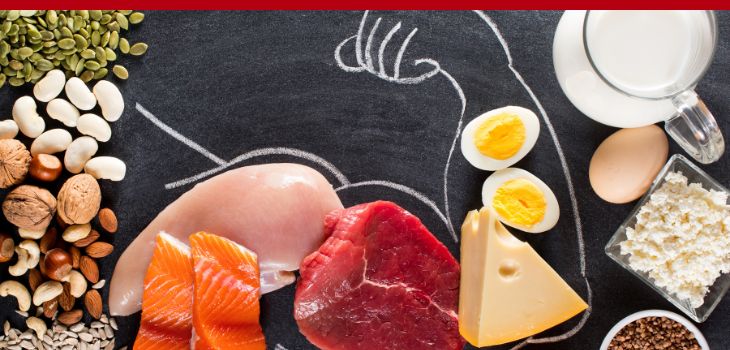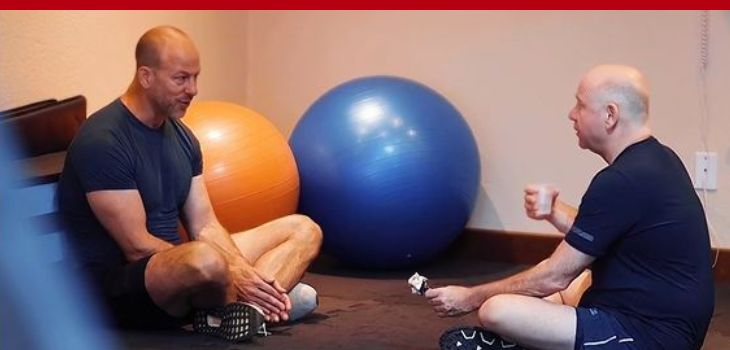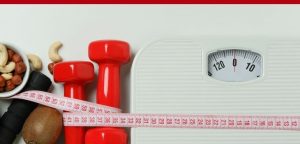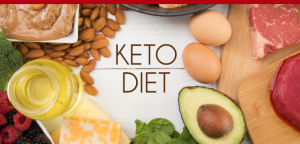by Ted Ryce
Muscle Building Training Series Part 3: How Protein Helps Increase Muscle Size and Strength (And How Much Protein You Should Eat To Build A Muscular Body) with Ted Ryce
by Ted Ryce
by Ted Ryce
Muscle Building Training Series Part 3: How Protein Helps Increase Muscle Size and Strength (And How Much Protein You Should Eat To Build A Muscular Body) with Ted Ryce
Muscle Building Training Series Part 3: How Protein Helps Increase Muscle Size and Strength (And How Much Protein You Should Eat To Build A Muscular Body) with Ted Ryce
more
by Ted Ryce
Muscle Building Training Series Part 3: How Protein Helps Increase Muscle Size and Strength (And How Much Protein You Should Eat To Build A Muscular Body) with Ted Ryce
If you’re over 40, you probably have more “stuff” going on in your life than you did at 21, making it difficult to focus on eating right and training regularly. But, with the right type of training, you can still build muscle and get strong well into your forties, fifties, and beyond.
In the first part of this training series, Ted talked about the importance of focusing on building lean muscle.
In part 2 he shared 6 smart ways to build muscle faster.
In part 3 he will talk about how protein helps increase muscle size and strength and will reveal how much protein you should eat to build a muscular body in your 40s, 50s and beyond. Listen now!
You’ll learn:
- The importance of protein for building muscle past age 40
- How much protein should you eat to add muscle?
- What type of protein is best for building muscle?
- Protein timing: when should I eat protein?
- And much more
Related Episodes:
Muscle Building Training Series Part 2: 6 Smart Ways to Build Muscle Faster
520: 5 Ways to Force Your Body To Build Muscle Faster with Ted Ryce
Links Mentioned
Watch My FREE Body Breakthrough Masterclass
Want To Lose Fat, Transform Your Body & Live Your Best Life In 2023?
I’m offering this blueprint that will lead you to a fail-proof long-lasting result with your body, with your health that will help you reach that potential that you have inside and become your own super self.
If you’re interested in working with me, you can reach out to my chat team and tell them a little bit about your situation and see if working with me would be a good fit for you.
>>Click Here To Schedule A Call With Me Now!
Podcast Transcription: Muscle Building Training Series Part 3: How Protein Helps Increase Muscle Size and Strength (And How Much Protein You Should Eat To Build A Muscular Body)
Ted Ryce: Welcome back to another episode of the Legendary Life podcast. I'm your host, Ted Ryce. This is the show that's all about taking your health, your body and your life to that next level.
And today, I'm back with a third installment on everything you need to know about building muscle in your 40’s, so this is the third installment, I recommend that you go back and listen to the introduction, where I talk about why you should care, because many of you may not care about building muscle.
In fact, you're probably in the gym thinking, Oh, I've got to burn some calories. However, that is not the way to get the best results from exercise or to live a long, healthy life.
We talked about sarcopenia, the age-related loss of muscle. We talked about the different types of muscle that you have in your body, and why that's relevant to what we went over in our second installment, which was lifting weights and why resistance training is so important, how to do resistance training properly.
And today we're going to tackle protein. So protein is the second most important thing that you need to take care of, if you want to build and or maintain your muscle mass.
I could do, I don't know, an entire, several hour long presentation on protein, but I really want to give you the most important parts.
In fact, that's what this multi episode muscle building masterclass is really about. And of course, I've got a muscle building course, if you want, of course you know where to check it out,
I already told you, it's on the website in the store.
And I go into this quite a bit deeper but let me tell you this. After lifting weights, protein is the second most important stimulus for muscle growth, because you're already eating protein. In fact, you would be dead if you weren’t. So that's how I know, if you don't eat protein, you die.
However, you don't need a lot of it to survive, but we're going to get into how much you do need to thrive, because that's what you’re after. Nobody wants to just eat by and be mediocre, we want to live a legendary life, right? We want a legendary physique or at least a legendary workout.
So, after lifting weights, protein is the second most important stimulus for muscle growth:
And a lot of people will probably get that, you already know that your muscles are made out of protein. When you eat a steak, that is animal muscle, that is cow muscle. So you understand that protein provides the amino acid building blocks so that you can actually have the raw material to build that new muscle with.
But what you may not know is that there's also a trigger to stimulate what is called, in the science-y exercise physiology world, muscle protein synthesis, the fancy term for muscle growth.
So protein is essential to good health. As I've mentioned before, you'll die if you don't eat enough of it, but you also need it to make hair, blood connective tissue, antibodies, hormones, hormones, like insulin and growth hormone are both protein-based hormones, as opposed to cholesterol based steroid hormones like estrogen and testosterone. Most of your enzymes are protein and more.
So how much protein should you eat to build muscle? This is a question that is hotly debated in nutrition circles. In fact, you'll get a lot of dieticians, and these dieticians, by the way, are the people who go to college, get their degree in dietetics so they can give you a diet for weight loss and they can do what's called medical, nutritional therapy, so people with kidney failure, or heart disease, they can design a diet for them.
And there are a lot of good ones out there, but there are a lot of ones who aren't the brightest stars in the sky, let's say.
So, the recommended dietary allowance for protein is a modest 0.8 grams per kilogram of body weight per day: for my non metric system using friends, in other words, the entirety of the United States and nowhere else in the world, is 0.36 grams per pound.
And unfortunately, a lot of dieticians who mean well, they read the recommended dietary allowance and they think, okay, well that's all the protein that you need, but it's important to keep in mind that the RDA is the minimum amount that you need to keep from getting sick, not the optimal amount for good health and a great physique.
And while research on the optimal amount of protein to eat for muscle building is ongoing, a recent systematic review of 49 studies on protein intake and lifting weights found that 1.62 grams of protein per kilogram of body weight per day was the optimal amount, that is .73 grams per pound of body weight per day.
And I know I'm shooting a lot of numbers at you, like .73 grams per pound, what the hell are you talking about? And we'll get into a little bit more practical, but what I want you to take away from this rate here is you can calculate based on how much you weigh, your protein requirements for the day, I just gave it to you.
All you do is multiply .73, times your body weight in pounds, and you've got how many grams of protein you need per day, and we'll get into how do I take to 140 grams of protein and how do I translate that into what I actually eat per day? We'll get into that.
And if you want to see this article, it will show you exactly. We’ll get into some examples and the article will have actual pictures, so it'll be a little bit more visual for those of you who like that sort of thing.
And if you don't want to do the math with the 0.73, because it can give you a kind of a strange number. You can just go with one gram per pound of body weight per day and make your life a little easier.
So if you're a woman who weighs 130 pounds, then you're going to eat 130 grams of protein per day. If you're a guy who weighs 200 pounds, you're going to eat 200 grams of protein per day, although that's a little bit higher than the recommended dosage, protein's not going to hurt you.
And what's interesting about protein is that it’s highly unlikely to end up as fat. I'm not going to go into that now, but there isn't, although it's definitely possible, the biochemical pathways are there to turn protein into fat, it doesn't seem to pan out in studies for some reason.
We'll talk about that on another time. In fact, I've got a protein researcher, who's going to come on the show and we'll get deeper into that, but for right now, let's just keep rolling. It's also important to point out that, while determining your protein in terms of your body weight seems logical, for smaller people it might not be enough and may be too much for people with high levels of body fat.
If you're obese, that is 25% body fat and higher for men, and 30% body fat and higher for women, you'll need to calculate your protein requirements differently. I mean, if you weighed 300 pounds, then you don't want to eat 300 grams of protein per day, especially when half of that, or 25% of that or more is body fat.
So if you know your body fat percentage, then eating one gram per pound of lean body mass is a better place to start. What does that mean? Let's take a 200 pound guy just to make the math easier.
So a 200 pound guy, he's 25% body fat, 25% of 200 is 50, so he would eat 150 grams per protein per day. Okay, I hope that's clear. And if you're kind of on the other side, if you're a 100 pounds, like Giselle is around a 100 pounds, then she might need to have a little bit higher amounts of protein to get optimal results from exercise.
So we'll, we'll talk a little bit more about that later, so just know that's important. There are at the extremes for people who really have small bodies or for people who are obese, it's going to be different. If you fall in the middle, just use what I've already told you, so that either one gram per pound of body weight, or you can come to the article and do the funky calculations to figure out .73.
So, if it's also important to note by the way, gender doesn't seem to matter when it comes to protein intake and muscle growth. So if you're a man or a woman doesn't matter.
So, like I said, we've talked a lot about how much protein per pound of body weight you should eat, and I remember how abstract that was when I first heard about that, and I struggled, even though I was in the fitness industry, I was struggling to go from, okay, I need to eat 180 pounds, 80 grams of protein per day. Well, how does that translate into what my actual meals in a day would look like?
And to help answer that question, I've created a chart that is in this article, but I'm going to go over a little bit of it now and by the way, the people in legendary lean, one of the things we get them to do, which may not be super fun, but is super helpful and enlightening for people, is that they measure out their food sometimes, so they know exactly how much they're eating, they get the idea.
Now we don't make them do that for the entire time, but they get the idea, they know all of a sudden, okay, well, that's what six ounces of protein looks like and how many grams of protein is in six ounces of meat? Well, it's this much and we give them a protein chart. That's one of the things that we do, and that's why it's so effective when people are able to stick with it and follow it.
So let's talk about the foods, the serving size and the grams of protein per serving size. So most cuts of beef and fish, for every ounce you're going to get about 6 to 7 grams of protein and there's no need, this is what I tell all my clients, who are like oh my God, it’s .357 grams over what I'm supposed to eat.
Look, this stuff, isn't exact science, okay? It's not hard math, it's not like balancing your checkbook, where you better not tell the IRS if you're doing the accounting for some business that’s it's a little bit off, but whatever, there’s some error in measurements. No
But with protein, with calories, with macronutrient measurements, there’s always a little bit of error, so don’t freak out about the minute details, focus on the big picture and then pay attention to the results and adjust from there. That's a little pro tip for you.
So most cuts of beef and fish are about 6 to 7 grams of protein per an ounce. An egg is about 6 grams, 5 to 6 grams of protein. Half a cup of cottage cheese is 12 grams of protein. An ounce of cup of Greek yogurt is about 18 grams of protein. Of course, you should be looking on the ingredients because this will be different for different versions, although I find Greek yogurt pretty consistent.
One cup of milk is about 8 grams of protein. Beans, half a cup of cooked beans is about 6 to 8 grams of protein, and we'll talk about the difference between animal and vegetable-based protein in a bit. Soybeans, half cup cooked is about 15 grams of protein, pretty high there for soybeans. Tofu, half a cup cooked is about 8 grams of protein, and nuts like peanuts and almonds, a quarter cup is about 8 to 9 grams of protein.
Seeds, a quarter cup of seeds like flax seed or sunflower seeds, pumpkin seeds are about 6 to 7 grams of protein. I'm just throwing that out there so you hear it, you don't have to memorize it, and if you want to see a chart, come to Legendary Life podcast.com and you'll get to actually see some of these and see, oh okay, so that's what it looks like.
So, let's get into what type of protein is best for building muscle? So are all sources of protein equal? And what I want to tell you is while the total amount of protein you eat during a day is probably the most important factor for muscle growth, the quality of protein you eat matters, and this is based on the research, animal-based sources of protein out shine plant-based sources for muscle building.
And in the past, we thought this issue with plant-based proteins was that most plant-based sources of protein, except for soy and hemp, I believe are incomplete protein. So incomplete proteins are low in one or more of the nine essential amino acids, and complete proteins have all nine of the essential amino acids.
However, you can easily combine different sources of incomplete proteins and get everything you need. For example, beans, which are the cornerstone of every longevity diet on earth, coupled with any grain makes a complete protein.
So you could eat some beans and quinoa, and if you're on a plant-based diet, I know we have some vegans and plant-based diet people, so that's something you could do, have something like fava beans and quinoa or soy beans and brown rice, something like that.
But more recently: it's been discovered that while having all nine of the essential amino acids is important, one amino acid in particular, leucine stimulates muscle growth much more than all the others by turning on something called mTOR, and mTOR used to stand for mammalian target of rapamycin.
Now they've changed it to mechanistic target of rapamycin, because of recent research, I guess, showing that animals other than mammals have it. So it turns out this M tour is like a molecular switch that turns on the machinery that manufacturers muscle and leucine is one of the major activators of M TOR.
As I've mentioned earlier: leucine rich sources of protein, not only provide the building blocks for building new muscle, it also plays a critical role in switching on the muscle protein synthesis process. And animal-based sources of protein, especially eggs and dairy have much higher levels of leucine than plant-based sources.
If you want to see a chart of the highest leucine containing foods, I've put that on this episode, at Legendary Life podcast.com, check it out there, but just know that whey protein actually has the most leucine of any protein source.
So if you've been taking whey protein, well now you know that it's good for something and now, you know why it's a good supplement compared to other supplements, which most of them don't work.
So the second thing: would be milk and the third, if for an actual food, something you could eat would be eggs. If you want to see the rest of them, check out this article, because the visual will help you, and it'll tell you exactly how many grams of leucine you get per a serving of each of these foods.
Now we know why animal-based sources of protein are best for building and maintaining muscle, but I also know that animal-based protein can be expensive and there's many folks following a plant-based diet out there as well.
So, it turns out that you can make up for the lower muscle building properties of plant-based protein by eating more of it, and there's another tweak where you actually had the amino acid leucine, but we're going to talk about that in another time.
So, you'll know that you got to eat more of plant-based protein, that means you should eat more of the recommendations, more than what I've recommended.
So if we're doing one gram per pound of body weight, you're going to need a bit more than that, and to be honest with you, nobody has given me a good answer when I've inquired and looked for the answer, like, well, how much more? So keep that in mind.
And if you're a vegetarian on a plant-based diet, just know that maybe having a bit more and, or finding some pea protein and adding that so that you get just the protein and not all the other things that come when you try to eat more nuts and seeds or tofu or peanut butter or beans, that's important because most plant-based sources of protein come with higher calories.
For example, beans have more carbohydrates and things like nuts and seeds have more fat, so that's something to keep in mind. I've also put up a picture on this idea in the article where it shows you how many calories you get per the same serving of protein, and I think it'll be kind of eye-opening for you.
Just to give you an example, three ounces of lean beef are about 180 calories, compare that to black beans, to get the same amount of protein, you'd have to eat 374 calories of black beans. So that's little bit over double, so something to keep in mind.
So now let's talk about when you should eat protein and when you should eat protein, that's referred to as protein timing.
And while the timing isn't as critical as the total daily protein intake and the quality of the protein you eat is something to consider if optimal results or your goal.
So scientists have looked into the timing of protein and its effects on protein synthesis. In fact, Dr. Stuart Phillips from McMaster university, who is the protein researcher that I said I was going to have on the show tested three different ways of taking 80 grams of protein in one day.
So he tried 8 equally space doses of 10 grams, 4 doses of 20 grams or 2 big doses of 40 grams of protein, and which one do you think panned out the best? You have your answer?
Well, they found that the 4 doses of 20 grams of protein produced the best results for increasing protein synthesis.
So you can eat all the protein you want, but unless you distribute it appropriately, you can still fall well below your body's needs for maximizing muscle growth. And this is a question that I've received a lot, like hey Ted, I just want to eat two meals a day, can I just put all the protein and just divide it up by two? And the answer is yes, of course you can do that, but it's not optimal.
So let's talk a little bit more about an exciting area of protein timing, which is pre-sleep protein.
So in other words, eating protein before you sleep.
So, I want to briefly tell you why this is important, why the timing is different and why it doesn't seem to matter when you eat the carbs or fat. With the carbs, depending on exercise, if you work out twice a day, you want to have the carbs right after the workout to replenish glycogen for your second workout, but in general, fat and carbs don't matter so much.
I know Kim Kardashians says 6 pm, don't eat carbs past 6 pm, but there's really no evidence to show that that has anything to do with anything. And I know Rob Wolf actually mentioned something about their circadian timing of carbohydrates. From what I've been able to read and ask experts, they haven't said that it's that important.
But protein is a bit different. Now you can store carbs and fat as you probably well know, but you can't store protein, and protein doesn't turn into fat so easily. So you need a constant supply of it to spike your, what are called amino acid pools.
So don't get too caught up in the science or whatever, all you need to know is that when you eat protein, you have these amino acid pools that fill up with amino acids and then they start to dwindle down in a few hours after eating. So then boom, you need to eat again, while carbs you can store them in your muscles, you store it in your liver as glycogen fat, you know where you store that and extra carbohydrates get stored as fat too, but protein is a little bit different.
So that's why the timing of protein matters, and the other macronutrients like fat and carbohydrates, not so much.
So research has shown that eating protein just before you go to bed increases muscle protein synthesis: and this means that you'll be building additional muscle when you do it consistently over time, especially if you didn't get all that you needed during the day.
And I got to tell you, this is something I tried when I was, I think 19 or 20 years old, and I immediately noticed a difference. I would take a protein shake before I went to bed and I noticed that, whoa, my body's starting to change much faster, and I think I was under eating protein at the time too, so that may have been part of it, but something to consider.
Now I don't do that. I'll have cottage cheese with some whey protein, because if I drink a protein shake before I go to bed, I'm going to be up a few times, taking a pee and sleep, as we'll get to in the fourth installment, you want good quality sleep because that can mess up your muscle building gains as well.
So how much protein should you eat before bed? Well, researchers have found that having about 40 grams of protein before bed was needed to increase muscle protein synthesis rates to significant levels. So if you had less, it wasn't bad, but it was it's like, okay, well how much is this going to actually work to build muscle?
So you want to have about 40 grams of protein and this is a bit different. I know it gets tricky, but this is kind of aside from what you ate during the day. So if you can maybe eat a little bit more protein or portion off 40 grams of protein to have before bed, it's something that I would try if building muscle is your goal, or I shouldn't say that, because a lot of you will say, well, building muscle, isn't really my goal, even though it really is, you just don't look at it that way and don’t describe your goal as that.
What I should say is, if you're having trouble losing fat, and changing your body, getting results from exercise, then would eat that protein before bed.
So, I also recommend that you use a casein supplement as it is 100% protein, and it's slower digesting than whey.
And casein, as you might know, there's two dairy proteins, whey and casein, and whey is what we already talked about, has the highest amount of leucine out of any protein source, but casein is the other side of that. Now it's not as high as leucine but it's slower digesting, and the research has shown that slower digesting protein, that really works well when you have it before bed.
Again, you can add this into your cottage cheese or Greek or Icelandic yogurt, and I wouldn't have a shake if you have the same issue that I do, where if you drink right before you go to bed, you're going to be up a couple of times, and we definitely don't want that.
So that wraps up this episode. I know we've covered a lot, but the main takeaways here are, make sure you're eating enough protein, how much protein? Shoot for one gram per pound of body weight.
If you're overweight or obese, you're going to have to change that you're going to have to go for about a gram per pound of lean body mass, so you're going to need to know your body fat percentage.
And if you're really small, if you're like a 98-pound person, then you're going to probably have to eat a bit more and maybe around, make sure you have that 40 grams of protein before you go to bed. So, I would have maybe 120 grams of protein if you're on the small side, just a FYI.
So we talked about how the quality of protein matters: Animal-based protein hands down, so there's no argument with this, so don't let anybody tell you differently, if they want to argue that maybe it's not as healthy or has more saturated fat, blah, blah, blah, okay, but those are different arguments. We're talking here about protein and its effect on muscle building.
And I'm not saying to eat beef all the time either, there's plenty of different options that you can have, and you should vary your protein sources, but it's hands down, more effective for building muscle than vegetable protein.
However, like I said, you can just eat more vegetable protein, but that usually comes at a caloric cost: You get more calories; you get more carbs if you eat beans or more fat, if you eat nuts and seeds, so you're going to need to factor that in to what you do.
We also talked about the timing of protein and how you don't store protein the same way that you store carbs and fat, and that a research study showed that when people ate 80 grams of protein and they divided it up into 8 servings of 10 grams or 2 servings of 40 grams or 4 servings of 20 grams, that the 4 servings of 20 grams of protein were superior for muscle protein synthesis.
We also talked about pre sleep protein and how, if you're not getting the results that you want, if you don't feel like you're getting the results from your hard workouts in the gym, that is something that I would try.
And even if you're doing it for fat loss, I would recommend that as well, protein just has this really amazing effect on your body, on your ability to transform your body.
That's all I've got and stay tuned for the next episode, the final installment of everything you need to know about building muscle in your 40’s. So enjoy your day and speak to you soon!
Sign up to receive email updates
Enter your name and email address below and I'll send you periodic updates about the podcast.









